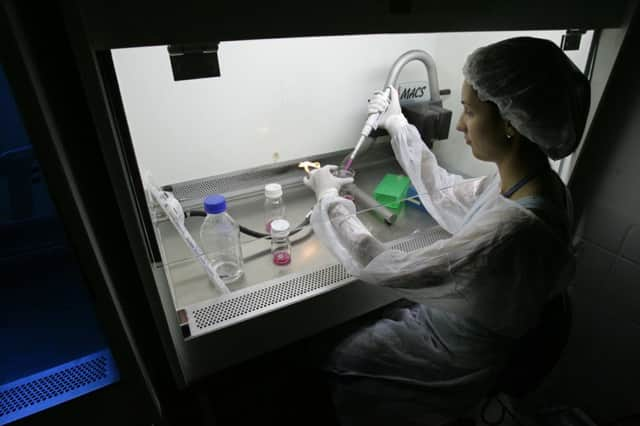Why geneticists want your blood


When the first human genome sequence was announced by Bill Clinton and Tony Blair in 2000 it was hailed as a hugely significant scientific breakthrough. A major milestone had been reached in the largest collaborative biological project the world has seen, with the ultimate goal of sequencing and identifying all three billion letters that make up our genetic instructions.
While the achievement should not be understated, what soon became clear was that there was possibly an even greater task ahead in trying to unpick what all of this information actually meant and how we could make use of it. That is something we at the University of Dundee are trying to do in the most effective and efficient way possible and, as such, our GoSHARE initiative encourages people to give us permission to use spare blood samples in genetic research.
Advertisement
Hide AdAdvertisement
Hide AdDecoding a genetic blueprint for our bodies that contains over three billion letters is relatively straightforward when you are just considering one person. Where it gets extremely tricky is when you try to work out what is going on throughout the population, because there are typically around three and a half million genetic differences between one individual and the next.
This is a good thing in one very important sense. If we were all genetically identical we would have a situation like the plant world where Dutch Elm Disease can wipe out an entire species. But we are all very different in how we respond to all diseases, medicines and many other factors. Where that makes things very complex is in trying to develop treatments that can work for enough people to be effective.
Trying to analyse the activity of multiple genes and decode the meaning of the genome was until recently not technically possible. However, advances in computing have placed researchers like myself in a completely different place. For around 20 years we were looking at genes one-by-one and one letter at a time. Over the last five years technology has been developed which allows us to look at billions of letters at a time. We can now examine multiple genes at once and work out patterns of interaction.
The technology that is coming will give us genome machines the size of a USB stick that will be able to do a DNA test in less than a second. And it will allow us to catalogue all the letters in the genome very quickly and cheaply.
This is science fiction turning rapidly into science fact. But it still needs to be managed carefully. What we have to do, and what is already happening here with projects like GoSHARE, is that we are gathering and managing that information in a way which can be applied to future healthcare. With rigorous methods we will get meaningful results that can be applied across the population.
Every day people are giving blood samples at their doctor or in hospital but from each sample there is some blood left over. What we are asking people is that they give us permission to use this blood for research. Over the past 15 years around 15 per cent of the Tayside population (50,000 people) have signed up to genetic studies and this has resulted directly in major discoveries of genetic variants for eczema, asthma, diabetes and heart disease, amongst others.
One particular important study that we are now undertaking is to find the genes that mark whether we have side effects to cholesterol lowering drugs (statins) and blood pressure medications (ACE Inhibitors). In the case of the statins we are interested in people who have had to change their drugs due to muscle pains or memory loss; with ACE Inhibitors, we are interested in individuals where the drugs have caused swelling in the mouth or throat, otherwise known as angioedema. These side effects are potentially dangerous and we are keen to provide a test to prevent susceptible people being given these drugs in the first place.
If you or anyone you know has had these problems we would be interested in hearing from you by e-mailing- [email protected] or calling 01382 383212 .
Advertisement
Hide AdAdvertisement
Hide AdWith the help of the Scottish public we can help make medicine more tailored to the individual rather than the old “one size fits all” approach.
• Professor Colin Palmer is Chair of Pharmacogenomics at the University of Dundee, www.dundee.ac.uk